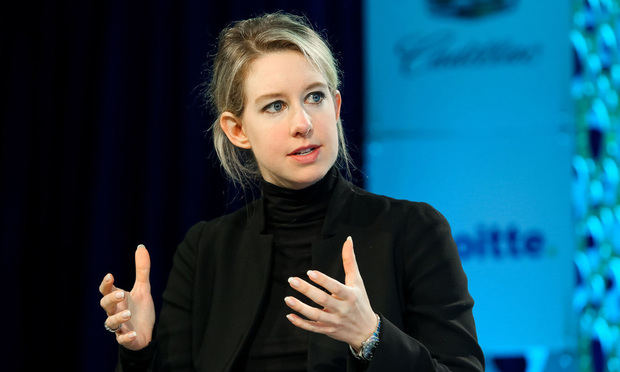
 Elizabeth Holmes, former CEO of now-defunct Theranos. (Photo: Krista Kennell/Shutterstock)
Elizabeth Holmes, former CEO of now-defunct Theranos. (Photo: Krista Kennell/Shutterstock)
The number of enforcement actions, fines and penalties levied by the Securities and Exchange Commission provide a "rough measure" of the agency's overall activity in policing wrongdoing, but they "do not provide a full and meaningful picture of the quality, nature and effectiveness" of the securities regulator's efforts, according to Steven Peikin, co-director of the SEC's enforcement division.
Indeed, the "undertakings" the agency took against Theranos and Tesla founder Elon Musk "provide unique benefits to investors in the long term," Peikin stated during a recent speech at the Practising Law Institute's White Collar Crime 2018 conference.
Peikin said that non-monetary relief such as undertakings and conduct-based injunctions as well as industry bars, suspensions and disgorgement are other important sanctions the agency uses to crack down on wrongdoing.
Peikin noted that in civil injunctive actions, the federal securities laws "permit the commission to seek — and federal courts to grant — any equitable relief that may be appropriate or necessary for the benefit of investors."
Two of the "most effective forms" of equitable relief in commission enforcement actions are undertakings, Peikin explained, "which require a defendant to take affirmative steps — either in conjunction with entry of the order or in the future — in order to come into and remain in compliance with the specific terms of the court's order, and conduct-based injunctions, which prohibit a defendant from engaging in conduct that, while otherwise legal, poses risk of harm to investors in the future."
The commission also has authority to impose similar obligations in administrative and cease-and-desist proceedings, he continued.
Undertakings "are a forward-looking remedy; they are specifically designed with an eye toward what happens after the settlement," Piekin said.
"When they are well-crafted, they unquestionably provide unique benefits to investors in the long term."



